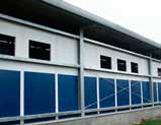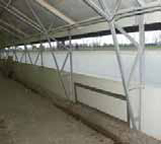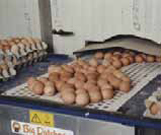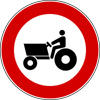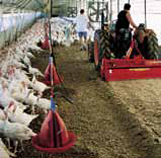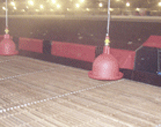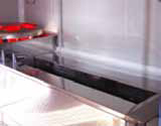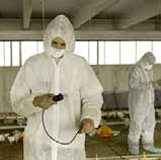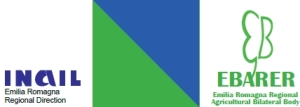Card 07.03 Avicultural and rabbit breeding
THE RISKS:
- Bio hazard (due to contamination: livestock arrival and slaughter phases)
- Cut injuries (due to equipment and tools use and sharp plate friction)
- Lower limbs vascular disease during working phase (due to continuous standing)
- Hearing damages (due to high noise)
- Fall (due to slipping on wet/with organic remains surfaces)
- Physic discomfort and respiratory system injuries (unfavourable working conditions and extended limbs cooling)
- Running down people or bumping materials (due to vehicles use)
It is necessary to remind that:
An appropriate facility designing and a strict observance of measures countering the zoonosis risk are the fundamental for accident prevention
in a breeding. Forthcoming european norms will dramatically change breeding systems, so it is advisable to come into line with these rules
as soon as possible, without forgetting operator's protection.
PRACTICAL AND OPERATING INDICATIONS:
Sheds shall be provided with:
- adequate locks;
- cement floor or made of washable material and washable walls and ceiling; and
- washable and disinfectable equipment.
Breedings shall be provided with:
- barriers (moving gates or rails) at the entrance preventing uncontrolled vehicle access;
- load/unload material and animal are as with washable, disinfectable and firm floors at shed's entrance;
- feed charging system for facilities reserved to breeder's breeding;
- cleaned surfaces all along the shed's external perimeter;
- protection of working material storage areas (new and cleaned litters, mechanical vehicles etc);
- breeding/loading equipment (fork-lifters, shovels, loading belts and machines); if the equipment is used by many farms, they shall be accurately washed and disinfected every time they enter/exit from different farms;
- a place for temporary waste depot (any material accumulation is forbidden nearby sheds).
Employer shall:
- forbid access to strangers;
- provide operator with clean clothes for any task performed in breeding;
- grant access to areas nearby sheds to nobody but vehicles for breeding activity and subject to accurate disinfection before entering the farm;
- register the entrance and the exit of operators, animals, equipment and motor vehicles from the farm;
- plan a deratization programme and a campaign against injurious insects;
- forbid staff to keep their own bird;
- make sure operator use exclusively disposable (or washable and disinfectable) packing and eggs (hatching or for consumption) transport materials;
- check though appropriate card (voucher attached to accompanying document) the vehicle's disinfection at the feed-stuff factory (once a week).
Workers shall:
- clean and disinfect equipment and rooms at the end of each process and before a new one;
- clean and disinfect silos every time new animals enter;
- wait the necessary time from the breeding clearing to the entering of new birds and the start of a new process (sanitary break);
- put dead animals in suitable cold chambers;
- check if the carcass collection is made by firms with authorized vehicles and if carcasses are sent to authorized disposal facilities;
- check if the carcass collection is made outside the breeding areas;
- stockpile litter and fowl droppings next to the breeding following the current regulations;
- remove litter with hermetically sealed and covered motor vehicles.
Operator shall use P.P.E. in particular when cleaning rooms from animal's droppings: disposable overalls, impermeable apron, disposable headwear, rubber boots (or made of polyurethane), rubber working gloves (or disposable gloves made of nitrile), respirators with a filtering power of at least FFP2D (full-face respirator) and protective mask (or goggles).
Reusable P.P.E. shall be adequately washed and disinfected, and after P.P.E. removal operator shall wash his/her hands with water and soap for 20 seconds at least.
Disposable P.P.E. shall be adequately disposed.
FURTHER INDICATIONS AND ADVICE
- It is forbidden to eat, drink or smoke in working places with bio hazard risk.
- Operator shall careful y wash his/her hands after coming into contact with animals or potentially contaminated surfaces and equipment; before eating or drinking and after taking off clothes or disposable P.P.E.
- Operator shall avoid touching his/her eyes, mouth and nose with filthy hands.
- Operator shall always separate civilian clothes from working ones using lockers with two compartments and/or expressly dedicated locker rooms. In case they shall wear disposable protective clothing.
- It is necessary to wash working clothes at high temperature or with specific disinfectants (e.g. containing quaternary ammonium cation/sodium hypochlorite).
- Operator shall always be extremely careful while collecting, storing and disposing wastes.
